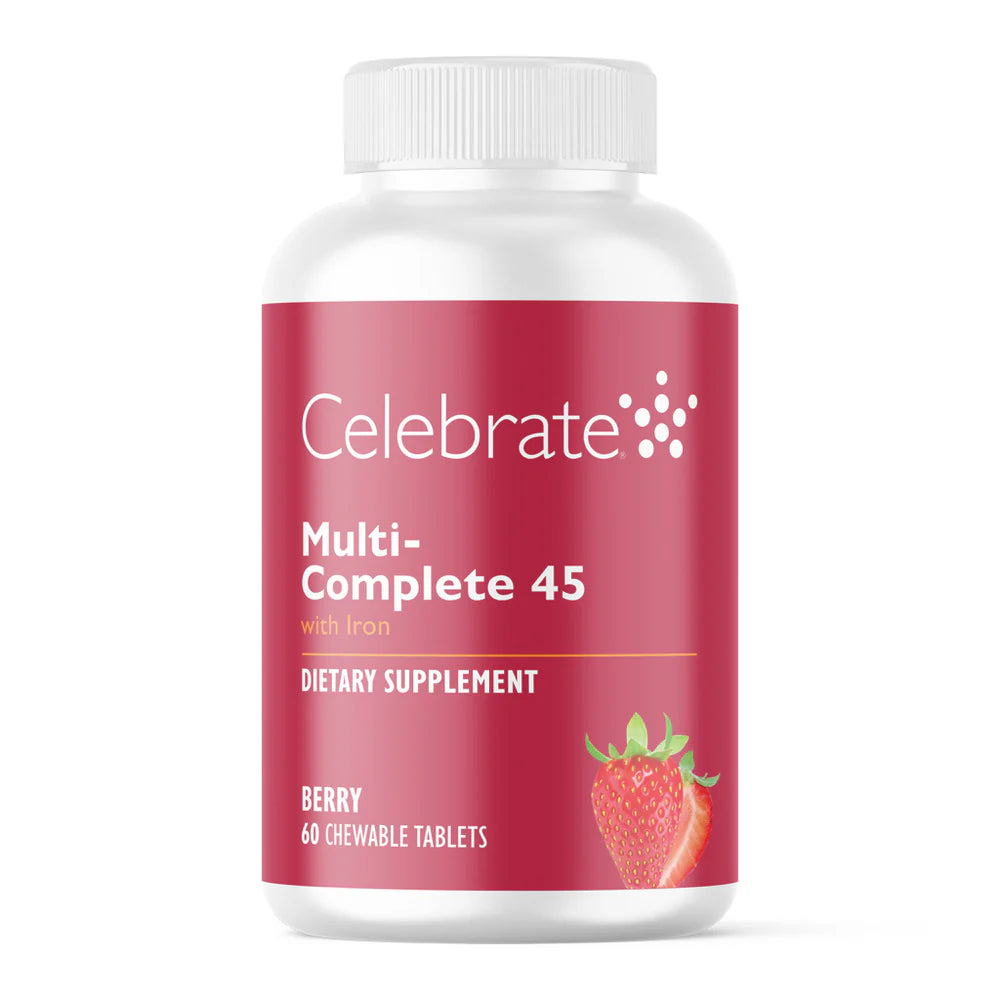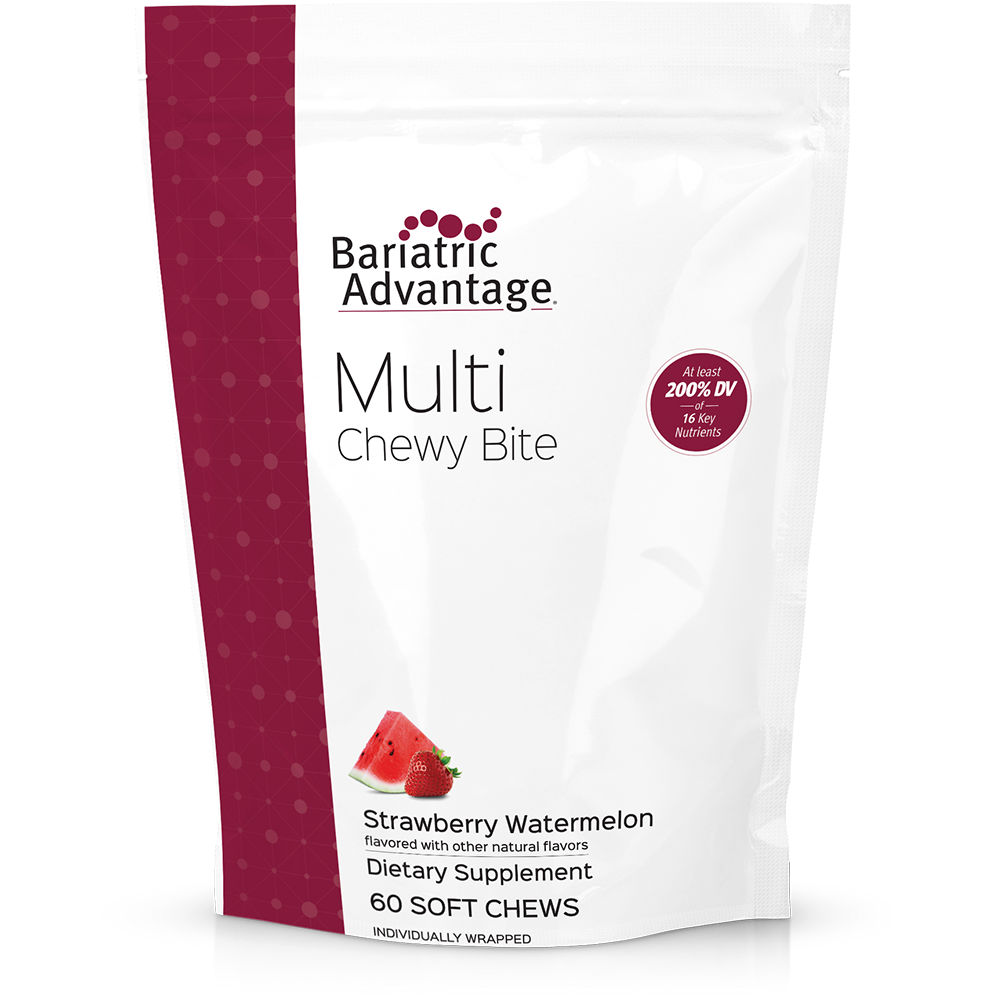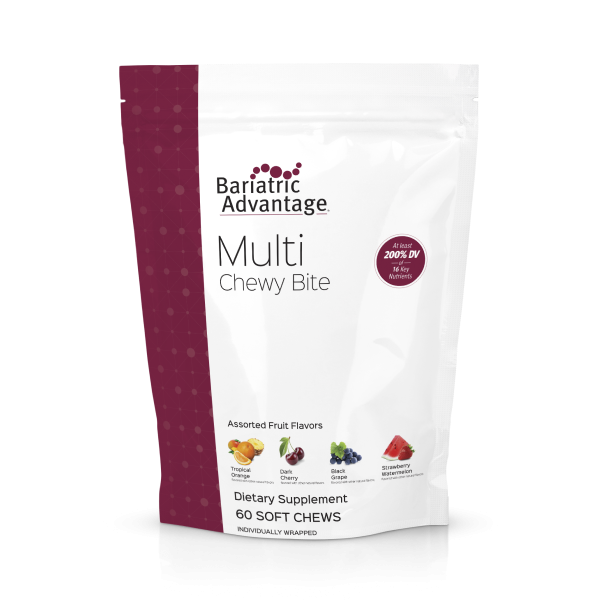Your cart is empty
Bariatric Foods
Bariatric foods are designed to help you recover after weight loss surgery. As your online bariatric food store, we’ve done the hard work for you, gathering a lineup of tasty, high-protein, low-calorie choices that make sticking to your post-op diet plan so much simpler.
Shop Related Bariatric Collections: Bariatric Protein Bars | Bariatric Shakes | Bariatric Soups | Bariatric Meals | Bariatric Snacks | All Bariatric Vitamins | Bariatric Multivitamins | Bariatric Calcium Chews
Brand
Dietary Concern
Product Type

Multi-Complete 45 Berry w/ Iron - Celebrate
- Price
- $24.95
Ultra SOLO without Iron - Bariatric Advantage
- Price
- $26

Multi Chewy Bites Strawberry Watermelon - Bariatric Advantage
- Price
- $35.50

Multi Chewy Bites Assorted Fruit Flavors - Bariatric Advantage
- Price
- $35.75

Chocolate Soy Snacks - Proti
- Sale price
- $10.20
- Regular price
- $14.89
A bariatric-friendly food is nutrient-packed and easy on your smaller stomach. It helps you heal, stay full, and get the vitamins you need without extra calories or discomfort. AmBari Nutrition products were originally designed for use in medical weight loss clinics, where most people were bariatric patients.
Best Bariatric Foods Start with High Protein
Protein builds up your body. It helps your muscles stay strong while you lose weight. Try to pick lean options so every bite helps more.
- Lean ground meat, poultry, or fish
- Eggs or soft scrambled eggs
- Cottage cheese
- Plant-based options like beans or nuts for complete proteins
If meat isn't for you, check out the high protein, low calorie products at Ambari Nutrition, like shakes and bars, to help with your protein.
Add Fruits and Vegetables
Fruits and veggies add fiber, vitamins, and minerals. They help you feel satisfied longer and support your health in so many ways.
- Soft fruits without seeds or skin
- Cooked vegetables like carrots or zucchini
- High-fiber choices to fill you up gently
Go for moist textures at first. Drier foods can be tougher to digest early on. After about a year, most people can handle a wider range.
"After bariatric surgery, every meal counts toward your recovery. Focus on foods rich in protein and nutrients to build strength and keep your energy steady without overwhelming your body. At AmBari Nutrition we've tailored products designed specifically for bariatric patients." says Dr. Kevin Huffman, bariatric physician.
Bariatric Diet Stages After Surgery
Your eating plan shifts in stages so your stomach can heal. Stick close to what your doctor says. It often starts with liquids and moves to solids over a few weeks. To make it simple, we've got collections for each stage in our store. Just click the stage you want to shop.
Bariatric Foods for Stage 1: Clear Liquids
Right after surgery, you'll be on a diet of clear fluids for a day or two. This hydrates you without any strain.
- Broth
- Unsweetened juice
- Decaffeinated tea or coffee
- Sugar-free gelatin
Bariatric Foods for Stage 2: Full Liquids & Blended Foods
After a few days, your doctor might move you to fuller liquids and then pureed foods. Go for smooth textures with no chunks. Have 3 to 6 small meals, about 4 to 6 tablespoons each.
- Blended lean meats or fish
- Soft fruits and cooked veggies
- Strained cream soups
Blend solids with water, skim milk, or broth to get it just right.
Bariatric Foods for Stage 3: Soft Foods
A few weeks in, your doctor or surgeon will let you add tender, easy-to-chew foods. Keep portions small, around one-third to half a cup.
- Flaked fish
- Cooked cereal or rice
- Canned soft fruits
- Cooked vegetables without skin
Chew everything well to avoid issues.
Bariatric Foods for Stage 4: Solid Foods
Around eight weeks out, this is when you can ease into firmer foods. Start with three meals a day, 1 to 1.5 cups each. Stop before you're too full.
Introduce new items one at a time. Watch for any discomfort.
Foods to Avoid on a Bariatric Diet
Some foods can cause problems like bloating, nausea, or dumping syndrome. Avoid these to stay comfortable.
- Carbonated drinks (they create gas in a small space)
- High-sugar items (they add calories without filling you)
- Fried or fatty foods
- Tough meats with gristle
- Raw or fibrous veggies like celery or broccoli at first
- Nuts, seeds, popcorn, or breads early on
Alcohol and too much caffeine can dehydrate you, so limit those too.
Bariatric Eating Tips for Long-Term Success
New habits take a while, but these steps can help you do well.
- Eat and drink slowly to prevent dumping syndrome.
- Drink 64 ounces of fluid daily, but not with meals.
- Keep meals small and focus on protein-rich choices.
- Chew food to a pureed consistency.
- Take daily bariatric multivitamins and minerals as recommended.
- Avoid high-fat and sugary foods.
If you notice issues like constipation or weight plateaus, reach out to your doctor. Everyone's path is unique, so listen to your body.
To get started, browse our selection of high protein, low calorie options at Ambari Nutrition. They're made to support you every step of the way.

Bariatric foods are specially made to fit the needs after weight loss surgery, but they're great for anyone wanting more protein with fewer calories. They usually have 15-30g of protein per serving, keep calories low (under 200), and include key vitamins and minerals. Lots of people use them for general weight management or boosting protein too.
It depends on the phase: Protein shakes often start in full liquids (around 2 weeks post-op), while bars and solids come in during soft foods (4-6 weeks) or later. Always check with your healthcare team to match your timeline.
Taste has come a long way—many are pretty enjoyable now. Try sample packs to test flavors, and tricks like blending with ice can make them even better.
Dumping happens when food rushes through too fast, leading to nausea or cramps. Stick to low-sugar options (under 5g), eat slowly in small bites, and wait 30 minutes after eating to drink. These foods are usually designed to help dodge that.
They can cost a bit more because of the special ingredients, and insurance often doesn't cover them (just the surgery). But bulk buys, sales, or powders can save money—and the ease makes it worth it for many.
Most programs suggest 60-100 grams daily, spread across meals. Focus on high-protein foods first to hit that without overeating calories.
Yes, usually a multivitamin, plus extras like calcium, vitamin D, B12, and iron—since absorption changes after surgery. Your doctor can guide what's best for you.
- Choosing a selection results in a full page refresh.








